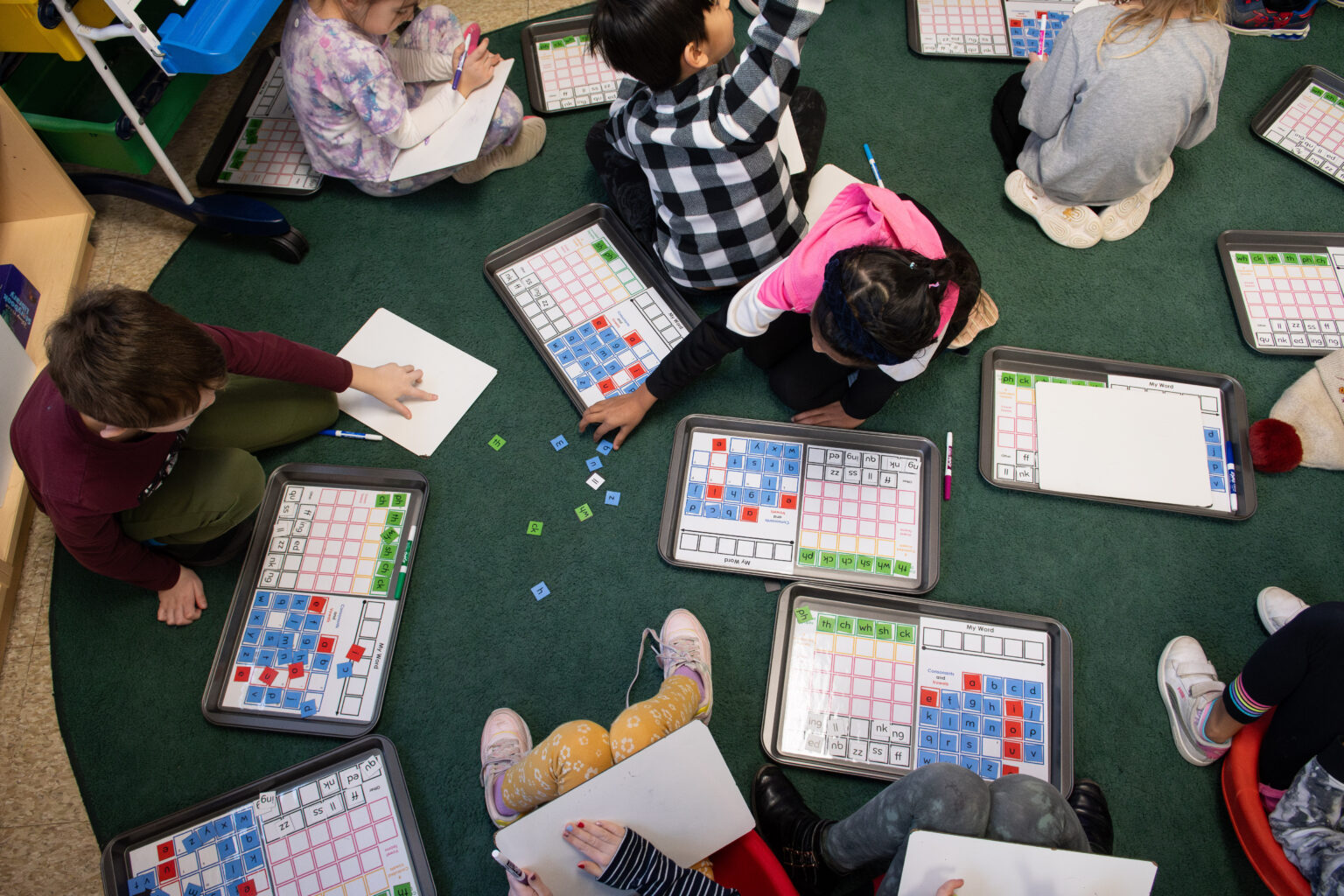May 16th, 2024
It was a busy day in class, and Rhys, Travis and Hafsa just finished learning about compound words. When asked about their favourite compound word, Rhys eagerly replied, “I like the word ‘sunset’ because it is the most beautiful part of the day”.
At Stewart Avenue Public School, and at schools across the Waterloo Region District School Board (WRDSB), a remarkable transformation is taking place in the way students engage with reading and writing, thanks to the innovative approach of the WRDSB Structured Literacy Multi-Year Plan (SLMYP).
“I like reading because reading makes you better at writing,” shares Travis with a gleam of excitement in his eyes. “You learn words and remember how to write them.” His enthusiasm for literacy reflects a newfound confidence and passion nurtured by the SLMYP, along with his peers.

With the introduction of the SLMYP, Travis and his classmates find themselves in a learning environment that prioritizes high expectations for all students and teaching of the foundational skills students need to be successful readers and writers. Importantly, this includes allowing each student to progress at their own speed and build upon their strengths.
The shift in teaching methods emphasizes understanding how written language works, encouraging students to engage actively in decoding and encoding—reading and writing—while making meaning from the text. As a student’s reading becomes more accurate and fluent, written texts become a more meaningful experience, with students actively making connections, reflecting on their learning, and expanding their vocabulary at an earlier age.
The SLMYP has expanded Rhys’ vocabulary, empowering him to express himself more eloquently and confidently in his writing. Gone are the days of rigid structures and limitations; instead, Rhys and his classmates are encouraged to embrace struggle as a natural part of the learning process, to engage in meaningful conversations, and to learn from one another’s experiences.

The shift from memorization to understanding has been transformative for the students. They now approach reading and writing with a sense of curiosity and exploration, unafraid to make mistakes, ask questions, and learn from one another, says Kate Fulton, a Grade 2 teacher at Stewart Avenue PS.
“The students now work more collaboratively and display such a great growth mindset,” explained Kate.
Structured activities and focusing on learning rather than memorization has made reading more meaningful. As students are learning to decode and read text for themselves, they are at the same time being exposed to a wide range of concepts and ideas through teacher read-alouds and multi-modal texts so that they can continue to build background knowledge, make connections and understand the deeper meaning behind texts.

Part of the structured literacy approach is to provide students with early small group interventions as needs become known. With a greater alignment between the existing evidence-based programs used for intervention and what is happening in the classroom, learning is happening at greater rates.
“I’ve had students that will stop and say, ‘We learned in class this week that when the ‘e’ is after a ‘c’, the ‘c’ makes the sound /s/.’ So they are applying the specific rules they’re learning in the classroom, to the work in the intervention groups. It’s furthering their understanding”, says Jennifer Whittaker, a Reading Resource Teacher (RRT) at Stewart Avenue PS.
Jennifer shared more about what her role as an RRT entails and how she helps to build a school community that supports every student in learning to read and write.
“By modelling the use of new resources and teaching practices and collaborating with teachers, my role is to help develop a supportive community focused on shifting teaching practices and improving reading outcomes for all children,” says Jennifer. The integration of innovative programs like University of Florida Literacy Institute (UFLI) and Empower™ has been instrumental in providing educators with a variety of perspectives, she explained.

With the new SLMYP, students learn that it’s okay to make mistakes, that learning takes lots of practice and that teachers are there to explicitly teach and give feedback so that students will know when they are successful. Students also learn from each other. Rhys, Travis and Hafsa are on a journey where the goal isn’t just to do well in school, but to always love learning new things. As their journey continues, it’s clear that curiosity and collaboration are becoming an important part of their education, and this will help them navigate the real world.

The WRDSB Structured Literacy Multi-Year Plan (SLMYP)
This story is just one in our series highlighting the work happening in classrooms across the WRDSB as part of our Structured Literacy Multi-Year Plan (SLMYP). Stay tuned for future stories that will share how we’re building student skills and supporting all students in feeling confident in their reading and writing skills.
The WRDSB Structured Literacy Multi-Year Plan represents a structured and evidence-based approach to literacy education grounded in research, informed by best practices, and focused on ensuring that all students have the support they need to develop essential language and literacy skills for academic success and well-being.